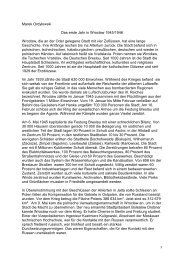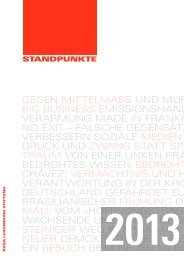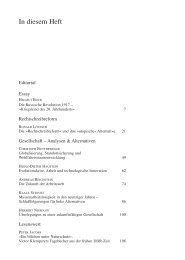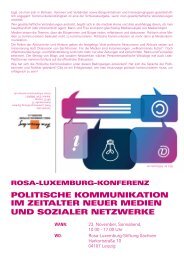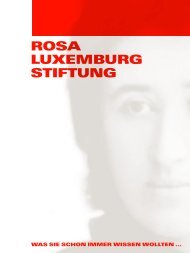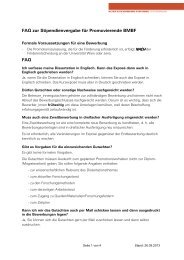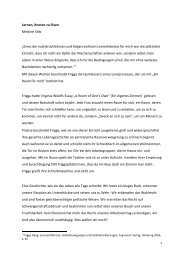The Left in Europe - Rosa-Luxemburg-Stiftung
The Left in Europe - Rosa-Luxemburg-Stiftung
The Left in Europe - Rosa-Luxemburg-Stiftung
You also want an ePaper? Increase the reach of your titles
YUMPU automatically turns print PDFs into web optimized ePapers that Google loves.
alternative hegemonic bloc? How can it create a society <strong>in</strong> which the freedom<br />
of the <strong>in</strong>dividual is the condition for the freedom of all, a society<br />
which the left-w<strong>in</strong>g parties of <strong>Europe</strong> can call socialist?<br />
In order to discuss such questions with parties, trade unions and social<br />
movements on the spot the <strong>Rosa</strong> <strong>Luxemburg</strong> Foundation – supported by its<br />
offices <strong>in</strong> Brussels, Warsaw and Moscow – works closely with its partners<br />
Transform!<strong>Europe</strong> and the parliamentary group of the <strong>Left</strong> <strong>in</strong> the <strong>Europe</strong>an<br />
Parliament. Together with the latter a long-term project on the non-social<br />
democratic <strong>Left</strong> <strong>in</strong> the <strong>Europe</strong>an countries was launched. With<strong>in</strong> this<br />
framework the country reports collected here constitute a first snapshot, a<br />
necessary basis for the elaboration of a jo<strong>in</strong>t research programme.<br />
<strong>The</strong> primary <strong>in</strong>tention is to give the reader an overview of the history<br />
and current situation of left-w<strong>in</strong>g parties <strong>in</strong> <strong>Europe</strong>, it be<strong>in</strong>g remembered<br />
that the articles express solely the views of the authors.<br />
<strong>The</strong> <strong>Left</strong> presents a very different picture <strong>in</strong> each of the <strong>in</strong>dividual countries,<br />
result<strong>in</strong>g from the different traditions and political structures <strong>in</strong> the<br />
country under consideration and from differences <strong>in</strong> the sense of identity of<br />
the various organizations. Among the left-w<strong>in</strong>g parties selected by way of<br />
example for the present volume are some that have evolved out of former<br />
rul<strong>in</strong>g communist parties, some that have a Eurocommunist background,<br />
some that come from the non-social democratic reformist <strong>Left</strong>, some that<br />
belong to the traditionally communist <strong>Left</strong> with a fem<strong>in</strong>ist extension, and<br />
others.<br />
<strong>The</strong> party-political <strong>Left</strong> as documented here is very much shaped by the<br />
economic, political and social situation <strong>in</strong> the <strong>in</strong>dividual countries, by its<br />
social milieu, by the strength or weakness of civil society, and by the trade<br />
unions and other social movements. It has to assert itself with<strong>in</strong> the political<br />
conditions of the local party and electoral systems. It is also shaped by<br />
the local social democratic parties, whose situation is often no less complex<br />
and without whom there will be no left-w<strong>in</strong>g majorities for a change of policy.<br />
But it is also a particular challenge for the radical <strong>Left</strong> if the social<br />
democrats – as <strong>in</strong> Slovakia, for example – are particularly successful.<br />
<strong>The</strong> <strong>Left</strong> is <strong>in</strong> search of a modern pluralist identity, between tradition<br />
and the social requirements of openness and renewal. Both exist <strong>in</strong> every<br />
party – both are lived and needed <strong>in</strong> parallel by the parties’ members, like<br />
the old symbols of the work<strong>in</strong>g class and the new symbols of a changed<br />
world. Such complicated clarification processes <strong>in</strong>evitably lead to splits to<br />
beg<strong>in</strong> with before stable new coalitions become possible <strong>in</strong> subsequent<br />
phases. In France, for example, the non-social democratic <strong>Left</strong> is split <strong>in</strong>to<br />
at least four parties, and it is currently attempt<strong>in</strong>g to rega<strong>in</strong> support through<br />
6



